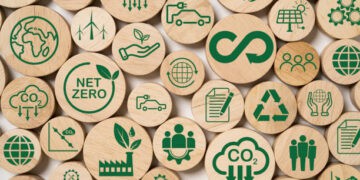In a move aimed at aiding global efforts to address climate change, the World Trade Organization (WTO) Secretariat introduced a comprehensive set of “Trade Policy Tools for Climate Action” during the 28th United Nations Climate Change Conference (COP28) in Dubai. The toolkit, consisting of ten distinct trade policy options, is designed to assist governments in aligning their strategies with international climate targets.
As the 2015 Paris Agreement’s effectiveness has been brought into question by the United Nations’ recent “global stocktake” ahead of COP28, the WTO Secretariat emphasizes the need for more substantial actions to combat greenhouse gas emissions. According to Director-General Ngozi Okonjo-Iweala, the toolkit offers practical solutions that can be incorporated into national climate strategies, such as nationally determined contributions (NDCs) and national adaptation plans (NAPs), to elevate climate ambitions.
“The toolkit builds on the Secretariat’s research work to shed light on ways that trade and trade policy can help accelerate and amplify the impacts of climate action for the benefit of current and future generations,” said DG Okonjo-Iweala. “The lesson is clear: without globally integrated supply chains, getting to net-zero emissions by mid-century would become much more expensive.”
The toolkit, a product of the WTO Secretariat, serves as a resource for policymakers and draws inspiration from existing practices among WTO members. It includes ten policy actions, which encompass trade facilitation measures, green government procurement policies, international standards for energy efficiency regulations, and more. The options presented in the toolkit aim to facilitate the adoption of low-carbon technologies, reduce environmentally harmful subsidies, improve trade finance for climate-related technologies, enhance food and agricultural markets for climate adaptation and mitigation, strengthen sanitary and phytosanitary systems, and harmonize climate-related internal taxes and policies.
In addressing import tariffs, the publication highlights the discrepancy between tariffs on fossil fuels like crude oil and coal, which face lower average tariffs, and tariffs on renewable energy equipment, which face higher average tariffs. The report suggests that reevaluating import tariffs to promote affordable and sustainable green energy solutions could be an effective strategy. It also notes that numerous WTO members have already reduced tariffs for environmental purposes, primarily for renewable technologies and low-carbon vehicles.
Regarding government procurement, the publication underscores the significant impact of public procurement on greenhouse gas emissions, with governments responsible for roughly 15% of such emissions through their spending, which amounts to approximately US $13 trillion annually. The report suggests that introducing climate-sensitive criteria for procurement while maintaining an open and efficient market can substantially decrease emissions. Data from the WTO’s Environmental Database reveals that WTO members have implemented over 70 environment-related government procurement measures since 2009.
Get the latest supply chain report news insights at The Supply Chain Report. For international trade resources, visit ADAMftd.com.
#WTO #TradePolicyTools #ClimateAction #COP28 #GlobalClimateChange #ParisAgreement #NetZeroEmissions #ClimatePolicy #GreenEnergy #SustainableTrade #ClimateSolutions #TradeAndClimate #LowCarbonTechnologies #EnvironmentalPolicies #GreenGovernmentProcurement #SustainableSupplyChains #ClimateAmbitions #ClimateAdaptation #TradeFacilitation #RenewableEnergy #ClimateChangeMitigation















